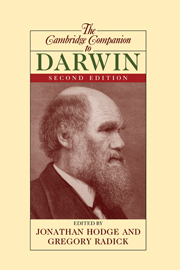Book contents
- Frontmatter
- Introduction
- Part I Darwin’s theorising
- 1 The making of a philosophical naturalist
- 2 The notebook programmes and projects of Darwin’s London years
- 3 Darwin on generation, pangenesis and sexual selection
- 4 Darwin on mind, morals and emotions
- 5 The arguments in the Origin of Species
- Part II Historical contexts
- Part III Current issues
- Part IV Philosphical prospects
- Guide to further reading
- List of references
- Index
4 - Darwin on mind, morals and emotions
from Part I - Darwin’s theorising
Published online by Cambridge University Press: 28 May 2009
- Frontmatter
- Introduction
- Part I Darwin’s theorising
- 1 The making of a philosophical naturalist
- 2 The notebook programmes and projects of Darwin’s London years
- 3 Darwin on generation, pangenesis and sexual selection
- 4 Darwin on mind, morals and emotions
- 5 The arguments in the Origin of Species
- Part II Historical contexts
- Part III Current issues
- Part IV Philosphical prospects
- Guide to further reading
- List of references
- Index
Summary
From the beginning of his theorising about species, Darwin had human beings in view. In the initial pages of his first transmutation notebook (Notebook B), he observed that 'even mind & instinct become influenced' as the result of adaptation to new circumstances. Considering matters as a Lyellian geologist, he supposed that such adaptations would require many generations of young, pliable minds being exposed to a changing environment. After all, Captain FitzRoy had attempted to 'civilise' the Fuegian Jemmy Button by bringing him to London and instructing him in the Christian religion; but back in South America, Button reverted to his old habits, demonstrating, in Darwin's words, that the 'child of savage not civilized man' - transmutation of mind was not the work of a day. Darwin had nonetheless quickly become convinced that over long periods of time human mind, morals and emotions had progressively developed out of animal origins. As he bluntly expressed it in his first transmutation notebook: 'If all men were dead, monkeys make men. - Men make angels.' Presumably the transmutation of human beings into those higher creatures remained far in the future.
- Type
- Chapter
- Information
- The Cambridge Companion to Darwin , pp. 96 - 119Publisher: Cambridge University PressPrint publication year: 2009
- 5
- Cited by

